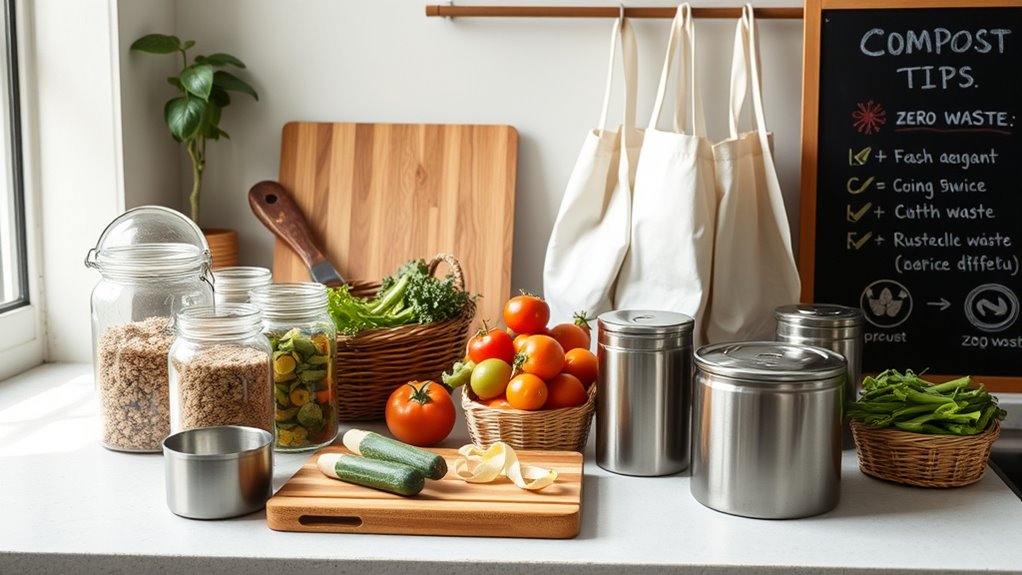To create a zero waste kitchen, focus on reducing packaging by shopping in bulk with your own containers, using reusable bags, and choosing loose produce. Store leftovers properly in glass or stainless steel containers, and repurpose food scraps for broths or compost. Practice mindful meal planning and portion control to prevent waste. Repair or donate items instead of discarding them, and explore composting options. Keep discovering new ways to minimize waste and maximize sustainability in your kitchen.
Key Takeaways
- Use reusable bags, containers, and cloth produce bags to minimize single-use plastics in the kitchen.
- Plan meals and buy ingredients in bulk, bringing your own jars to reduce packaging waste.
- Store food properly with airtight containers and practice composting to reduce spoilage and organic waste.
- Practice batch cooking and freeze leftovers to cut down on daily food waste.
- Repair or repurpose utensils and containers, and donate unused items to promote sustainability.

Ever wondered how your kitchen habits impact the environment? Every choice you make in your kitchen ripples outward, influencing waste, resource consumption, and pollution. By adopting a zero waste approach, you can considerably reduce your environmental footprint while also saving money and creating a more sustainable lifestyle. It starts with mindful planning and small adjustments that add up over time.
Your kitchen choices shape the environment—start small, think zero waste, and make a big impact.
First, focus on reducing your reliance on single-use plastics. Bring your own reusable bags when shopping for groceries, and use cloth produce bags instead of plastic ones. Invest in durable containers for storing leftovers and bulk items, and opt for glass or stainless steel rather than plastic. This way, you’re not only cutting down on waste but also avoiding the potential toxins found in some plastics.
When purchasing ingredients, choose loose produce over pre-packaged items, which often come with unnecessary packaging.
Another key step is to prioritize buying in bulk whenever possible. Bulk sections at grocery stores allow you to purchase exactly what you need, reducing packaging waste. Bring your own jars or containers to fill up with grains, nuts, spices, or dried fruits. This method minimizes packaging waste and often saves you money.
When shopping, try to buy only what you need and plan meals ahead to prevent food waste. Overbuying leads to spoilage and unnecessary disposal, so make a shopping list and stick to it.
In your kitchen, practice proper food storage to extend the life of your produce and leftovers. Use airtight containers, beeswax wraps, or cloth bags to keep food fresh longer.
Compost fruit and vegetable scraps rather than tossing them in the trash; composting reduces landfill waste and creates nutrient-rich soil for your garden. If composting isn’t an option, look into community composting programs or worm bins suitable for apartment living.
Cooking smarter also plays a role. Use leftovers creatively in new meals to minimize waste. For example, vegetable scraps can become broth if boiled down, and stale bread can be turned into croutons or breadcrumbs.
Being mindful of portion sizes also helps prevent uneaten food from ending up in the trash. Consider batch cooking and freezing portions for later, reducing daily cooking waste and saving time.
Furthermore, educating yourself about the benefits of recycling and waste management can motivate you to adopt more sustainable kitchen habits. Finally, repair and repurpose whenever possible. Instead of discarding damaged utensils or containers, see if they can be fixed or repurposed. Use jars and containers for storage, and donate items that are still usable but no longer needed.
Frequently Asked Questions
How Can I Compost Effectively in an Apartment?
You want to compost effectively in an apartment, which is totally doable. Start by choosing a compact compost bin with a lid to contain odors. Keep it in a well-ventilated area, like your balcony or kitchen corner.
Feed it daily with vegetable scraps, coffee grounds, or eggshells. Turn the compost regularly to aerate. Remember, balance greens and browns, and empty it when it’s full to maintain a healthy, odor-free system.
What Are the Best Zero Waste Food Storage Options?
When it comes to zero waste food storage, you should prioritize reusable options. Glass jars and stainless steel containers are great because they don’t stain or retain odors.
Beeswax wraps are perfect for wrapping produce and leftovers, replacing plastic wrap.
You might also consider cloth produce bags for fruits and vegetables.
How Do I Reduce Plastic Packaging While Shopping?
To reduce plastic packaging while shopping, bring your own reusable bags, containers, and produce wraps.
Opt for bulk sections, using your containers to fill up instead of buying pre-packaged items.
Choose items with minimal or no packaging, and support stores that prioritize sustainable packaging options.
Can I Reuse All Food Packaging Safely?
You might wonder if you can reuse all food packaging safely. While some plastics and containers are designed for reuse, others aren’t, and reusing certain packaging could pose health risks.
Always check for recycling symbols and manufacturer instructions. When in doubt, clean thoroughly and avoid reusing packaging that held raw meats or greasy foods.
Prioritize glass or food-grade containers for safer, eco-friendly reuse.
What Are Eco-Friendly Cleaning Alternatives for the Kitchen?
You’re wondering about eco-friendly cleaning options for your kitchen. You can switch to natural ingredients like vinegar, baking soda, and lemon juice, which effectively clean without harmful chemicals.
Use reusable cloths instead of paper towels, and opt for biodegradable scrubbers. These alternatives are safe for your family and better for the environment.
Plus, they’re often cheaper and readily available, making your kitchen greener and cleaner with less waste.
Conclusion
So, here you are, marveling at your waste-free kitchen—thinking you’ve cracked the code. Ironically, the more you avoid waste, the less material remains to throw away, making trash a thing of the past. But perhaps the true victory is realizing that minimal waste isn’t just good for the planet, it’s good for your sanity. Who knew that reducing trash could make you feel so accomplished—and slightly smug? Welcome to the zero waste life, where less truly is more.









